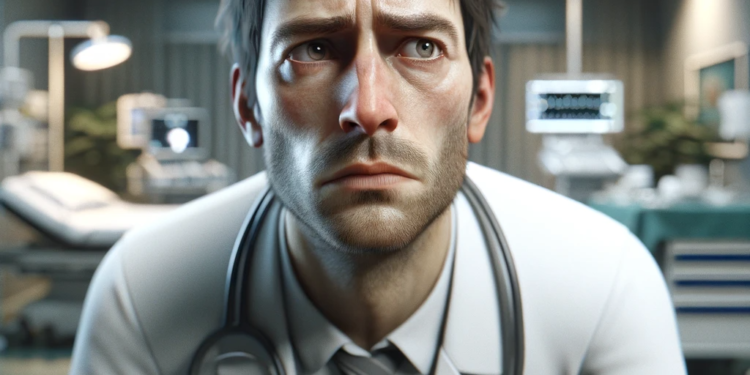
My biggest fear in medicine is messing up. Inevitably, it happens. As a young trainee psychiatrist, I lost a patient to suicide within 6 months of starting in the specialty. Was this an error or inevitable? And while we rightly are trained to reflect, detect and learn from errors, improve practice, and ultimately save lives, the flip side – the cost of excessive perfectionism – can be very high, especially on physician well-being.
For weeks my mind roiled with self-doubt, “Did I do everything right?”, “Did I miss anything?”, “What could I have done better?”. This morphed into, “I’m a bad doctor”, “I’m a failure”, “I must have done/said/prescribed/diagnosed something wrong”. Making rational decisions about patients’ suicide risk became almost impossible for me (and the science suggests that neither the tools we have nor clinicians themselves are adept at predicting such a rare and catastrophic event).
In the aftermath of an adverse event in patient care, these are common thoughts among dedicated and caring physicians everywhere. I’ve heard similar from surgeons, internal medicine specialists, residents, professors, and everyone in between. Even orthopedists on occasion 😉
Modern medicine finds itself entangled in the toxic trio of burnout, stress, and dissatisfaction, with perfectionism pulling the strings.
It’s time for physicians to take a step back, trade our obsessive fear-based scalpel-polishing for a mirror (I include the mirror sub-type recommended in Samuel Shem’s The House of God), and reflect on the impact of this perpetual pursuit of perfection on their well-being and patient outcomes.
Perfectionism in medicine is about setting rigid or unnecessarily high standards for flawless work or performance for yourself or others. Doctors are expected to know all the answers — and because medical mistakes can have fatal consequences.
Perfectionists can be so focused on avoiding failure that they neglect self-care. They’re often unhappy even when they achieve success and tend to get stuck on the details, which can make them slow and inefficient. The feeling that their best is never good enough can lead to anxiety, depression and suicidal ideation, according to studies in BMC Medical Education.
So we do our best to avoid whatever we define as medical imperfection. Let’s look at this in three real life cases of toxic physician perfectionism:
It's time for physicians to take a step back, trade their obsessive scalpel-polishing for a mirror, and reflect on the impact of this perpetual pursuit of perfection on their well-being and patient outcomes.
(names marked below with * are pseudonyms to protect the physicians’ privacy).
1. Dr. Smith’s rigid perfectoscopy
Dr. Smith*, a highly skilled surgeon, became known for his relentless pursuit of perfection in the operating room. While his technical abilities were exceptional, his perfectionism manifested as an intolerance for any deviation from his meticulously planned procedures. This rigid mindset resulted in a stressful working environment for his team, with colleagues feeling hesitant to voice concerns or suggest alternative approaches. Eventually, Dr. Smith’s pursuit of perfection led to increased stress levels, strained relationships within the medical team, and a decline in overall morale.
2. Dr. Johnson’s detailed documentation disaster
Dr. Johnson*, an experienced internist, developed a reputation for spending excessive hours meticulously documenting patient cases. While thorough documentation is crucial, Dr. Johnson’s perfectionistic tendencies took a toll on his well-being. He often found himself working late into the night, sacrificing personal time, and neglecting self-care. This relentless pursuit of perfect documentation not only contributed to burnout but also detracted from the time he could spend on direct patient care and collaborative efforts with colleagues.
3. Dr. Rodriguez’s fear of “failure”
Dr. Rodriguez*, a young and ambitious emergency room physician, was paralyzed by the fear of making mistakes. This fear, rooted in perfectionism, led her to double and triple-check every decision, order, and diagnosis. While her intentions were to ensure patient safety, the constant need for reassurance and validation slowed down the pace of emergency care. Dr. Rodriguez’s colleagues observed her increasing anxiety, and her patients experienced delays in critical interventions due to her hesitancy to make decisions swiftly. Ultimately, her toxic perfectionism not only affected her own well-being but also compromised the efficiency of the emergency department.
Physicians need to be kinder to ourselves and start to explore the concept that being good enough is enough.
These examples, based on collages of real doctors, illustrate how toxic perfectionism can manifest in different areas of medicine. And it can impact not only the individual physician’s mental health but also the overall functioning of the healthcare team and the quality of patient care.
Addressing and mitigating such perfectionistic tendencies is crucial for fostering a healthier and more collaborative medical environment. More importantly, physicians need to be kinder to ourselves and start to explore the concept that being good enough is enough.
Enter John Bowlby’s “good enough parent” framework—a concept that sounds like heresy in a profession where perfection is the holy grail. But what if the elusive quest for perfection is the very thing jeopardizing the well-being of doctors and the quality of patient care?
Bowlby, a pioneer in attachment theory, introduced the revolutionary concept of the “good enough parent,” (originally, the good enough Moether), arguing that parental adequacy, not perfection, is key to healthy child development. This framework suggests that an imperfect but consistently nurturing caregiver fosters resilience, independence, and emotional well-being in a child.
As another pioneer in this field described it, being good enough was “Failing in manageable ways” — Donald Winnicott.
But we are not children, I hear you say! You would be correct (except if you were Doogie Howser), and I’m not arguing that we need to go back to childhood and have 20 years of analysis. However, the principles of being a good enough parent can, I will argue, be applied to a healthier way of being a doctor.
In Part 2, we’ll explore the potential healing power of Bowlby’s “good enough” framework—a prescription for physician well-being that challenges the status quo with a touch of unconventional wisdom.
